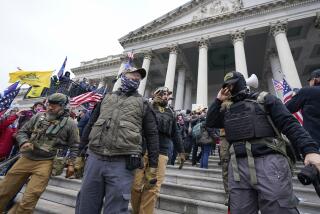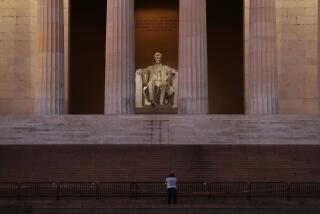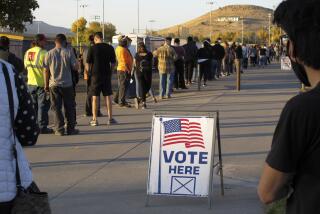Harry Truman, Lincoln’s heir
Presidents Day, which falls between the birthdays of George Washington and Abraham Lincoln, celebrates the contributions of those presidents. But here’s a nomination for another president worth remembering on this long weekend: Harry Truman, the first of the presidents who succeeded Lincoln to accomplish anything of consequence to redress the injustices that black Americans continued to suffer long after their emancipation.
Driven by black protests, and by his own conscience, Truman ordered the integration of the armed forces and threw the weight of the federal government behind the legal struggle to end segregation in the nation’s schools and housing. More broadly, with a flood of public utterances and proclamations, he put the prestige of the highest office in the land on the side of the least favored Americans, paving the way for the civil rights revolution of the 1960s.
During the interval between Lincoln, the 16th president, and Truman, the 33rd, blacks had grown accustomed to hypocrisy and broken promises from the president, regardless of his party. “May God write us down as asses if ever again we are found putting our trust in either the Republican or the Democratic parties,” declared the leading black intellectual of his day, W.E.B. DuBois, in 1922 after the latest betrayal, this time by Republican President Warren G. Harding.
Despite such duplicity, out of loyalty to Lincoln’s memory, black voters continued to give their support, if not their trust, to GOP presidential candidates for decades after the Civil War. It took the Depression and Franklin D. Roosevelt’s New Deal to turn the tide of black voters in favor of the Democrats, and that had more to do with economic issues than it did with civil rights, which simply weren’t on FDR’s agenda.
Truman, who became president in 1945 after Roosevelt’s death, changed all that. Given his heritage as the descendant of slaveholders, the man from Missouri seemed an unlikely champion of civil rights. But just as Lincoln’s resolve to abolish slavery grew stronger during his presidency, Truman’s views on race evolved. His views on the 16th president evolved also.
“My family didn’t think much of Lincoln,” he recalled. Some had even cheered his assassination. “I began to feel just the opposite,” he said, “after I’d studied the history of the country and what he did to save the Union.”
As president, Truman was spurred to action on civil rights by the violent reactions of white Southerners against blacks who sought to lay claim to their full rights as citizens in the wake of World War II. He was particularly appalled when black ex-servicemen were victimized.
Die-hard Southern segregationists in Congress made legislative initiatives extremely difficult. But, as Truman told a 1948 campaign rally in Harlem, “I went ahead and did what the president can do, unaided by Congress.”
That turned out to be quite a lot. He issued an executive order smashing the color line in the armed services, and he set up a watchdog committee to make sure that, despite intense resistance from the military’s top brass, his order was carried out.
He also approved deploying Justice Department lawyers as “friends of the court” to support private plaintiffs who were attacking discrimination across the social and economic spectrum.
In December 1952, just before the end of his final term, Truman approved the Justice Department’s filing of a brief in support of the plaintiffs in Brown vs. Board of Education, which challenged school segregation. To the consternation of Truman’s successor, Dwight D. Eisenhower, it was the Justice Department’s argument, which buttressed the contention of the NAACP representing the plaintiffs, that the Supreme Court embraced in 1954 when it handed down its historic decision overturning the color line in schools.
Were Truman’s actions calculated to win elections? The president knew that his civil rights efforts would probably help him win black voters in the big cities of the North in the 1948 election. But he also knew that whatever gains he made with black Americans would carry a price among whites, particularly in the South. So political calculus alone wasn’t Truman’s motive when it came to civil rights.
In 1952, Truman told graduating students at Howard University that many people had advised him that by raising the issue, he would make things worse. “But you can’t cure a moral problem or a social problem by ignoring it,” he said. “Now instead of making things worse, our efforts in the field of civil rights have made things better — better in all aspects of our national life and in all parts of our country.”
That concept of linking civil rights and morality encouraged the next Democrat in the White House, John F. Kennedy, to advocate a bold civil rights agenda. And that in turn inspired Kennedy’s successor, Lyndon B. Johnson, to not only push through Congress Kennedy’s program but also to advance a civil rights agenda of his own, including a voting rights act.
In launching his second term on the steps of the Capitol last month, Obama cited the “self-evident” truths that help form the American creed, particularly the promise of equality for all. The country’s 44th president added pointedly: “History tells us that while these truths may be self-evident, they have never been self-executing.” The 16th president and the 33rd would have heartily agreed.
Robert Shogan, a former Washington correspondent for The Times, is author of the forthcoming book “Harry Truman and the Struggle for Racial Justice.”
More to Read
A cure for the common opinion
Get thought-provoking perspectives with our weekly newsletter.
You may occasionally receive promotional content from the Los Angeles Times.






